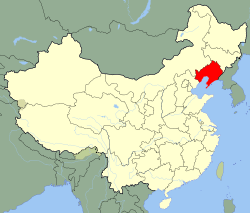Sujiatun Thrombosis Hospital

The Sujiatun Thrombosis Hospital, officially known as the Liaoning Provincial Thrombosis Treatment Center of Integrated Chinese and Western Medicine,[1][2] is a public hospital opened in December 1988 in the Sujiatun district of Shenyang, in northeast China. The hospital is a joint venture with a company associated with the Malaysian government,[3] and has gained several awards for research.[4]
In March 2006, 3 allegations emerged that the hospital was being used for live organ harvesting from about 6,000 Falun Gong practitioners being held prisoner.[5][2][6]
Hospital
Sujiatun Thrombosis Hospital was opened in December 1988 as the Shenyang Research Institute of Thrombosis and Liaoning Province Thrombosis Treatment Center of Integrated Chinese and Western Medicine. It is a thrombosis treatment centre approved by the State Administration of Traditional Chinese Medicine, a class A Grade three hospital, a national Traditional Chinese Medicine (TCM) hospital, the general hospital for the Liaoning province and a teaching hospital for the Liaoning University of TCM.[4]
The total hospital site is 21,087 square meters. The hospital has 27 clinical departments employing 460 people, and has 300 beds.[4]
The hospital has been granted several awards for research, including the Gold Prize at the 9th Inventions Exhibition and the Gold Cup Prize of China Excellent Invention Result. In November 2001, research at the hospital was awarded the Gold Prize at the 50th World Exhibition of Innovation, Research and New Technologies in Brussels.[4]
Organ Harvesting
In March 2006, three individuals alleged that thousands of Falun Gong practitioners had been killed at Sujiatun Thrombosis Hospital, to supply China's organ transplant industry.[5][2][6][1][7] The third person, a doctor, said the so-called hospitals in Sujiatun are but one of 36 similar concentration camps all over China.[6] The claim came against a background of international concern regarding China's transplantation programme and the persecution of the Falun Gong,[8] a spiritual movement banned in China in 1999, but not Hong Kong.
Within a month, U.S. representatives said they found no evidence that a site in northeast China had been used as a concentration camp, but "the United States remained concerned over China's repression of Falun Gong practitioners and by reports of organ harvesting".[9]
Dissident human rights activist, Harry Wu, said that stated "no concrete or substantiated evidence, such as documents or photos, have been provided to support the witness’ statements".[10]
The Kilgour-Matas report,[11] by former Canadian Secretary of State David Kilgour and human rights lawyer David Matas stated, "the source of 41,500 transplants for the six year period 2000 to 2005 is unexplained" and "we believe that there has been and continues today to be large scale organ seizures from unwilling Falun Gong practitioners".[11]
Appendix 16 of the Kilgour-Matas report[11] discusses the Sujiatun issue and refutes Harry Wu's comments. Appendix 18 of the report is the transcript of an interview David Kilgour had with the ex-wife of a Chinese surgeon who removed corneas from about 2000 Falun Gong practitioners at the hospital.[11]
Investigative journalist Ethan Gutmann estimates 65,000 Falun Gong practitioners were killed for their organs from 2000 to 2008.[12][13]
References
- ↑ 1.0 1.1 Gertz, Bill (24 March 2006). "China harvesting inmates' organs, journalist says". Washington Times. Retrieved 21 October 2008.
- ↑ 2.0 2.1 2.2 "New Witness Confirms Existence of Chinese Concentration Camp, Says Organs Removed from Live Victims" 17 March 2006 The Epoch Times
- ↑ "CLINICAL TRIAL PROPOSAL: A multi-center, open label trial to demonstrate the clinical effectiveness and safety of combined Traditional Chinese and Modern medicines in patients with recent stroke". Clinical Research Centre, Kuala Lumpur Hospital. 15 January 2005. Archived from the original on 30 June 2006.
- ↑ 4.0 4.1 4.2 4.3 General Situation of National Traditional Chinese Medicine Thrombus Treatment Center of P.C.R thrombusres-cn.net
- ↑ 5.0 5.1 "Secret Chinese Concentration Camp Revealed" 10 March 2006 The Epoch Times
- ↑ 6.0 6.1 6.2 "Source Reveals Other Chinese Concentration Camps, Sujiatun is merely one of 36 concentration camps for Falun Gong in China" 31 March 2006 The Epoch Times
- ↑ Nordlinger, Jay (30 March 2006). "A Place Called Sujiatun". National Review. Retrieved 8 January 2015.
- ↑ Thomas Lum (25 May 2006). "CRS Report for Congress: China and Falun Gong" (PDF). Congressional Research Service.
- ↑ "U.S. Finds No Evidence of Alleged Concentration Camp in China Repression of Falun Gong". Washington File. 16 April 2006. Retrieved 21 October 2008.
- ↑ Wu, Harry (8 June 2006). "Statement of Harry Wu about Sujiatun issue". Observechina.net. Archived from the original on 17 July 2011.
- ↑ 11.0 11.1 11.2 11.3 David Kilgour, David Matas (6 July 2006, revised 31 January 2007) An Independent Investigation into Allegations of Organ Harvesting of Falun Gong Practitioners in China (in 22 languages) organharvestinvestigation.net
- ↑ Jay Nordlinger (25 August 2014) "Face The Slaughter: The Slaughter: Mass Killings, Organ Harvesting, and China’s Secret Solution to Its Dissident Problem, by Ethan Gutmann", National Review
- ↑ Ethan Gutmann (10 March 2011) "How many harvested?" revisited eastofethan.com
External links
- Sujiatun "Organ Harvesting" Camp in China (5 minutes) youtube.com
- thrombusres-cn.net